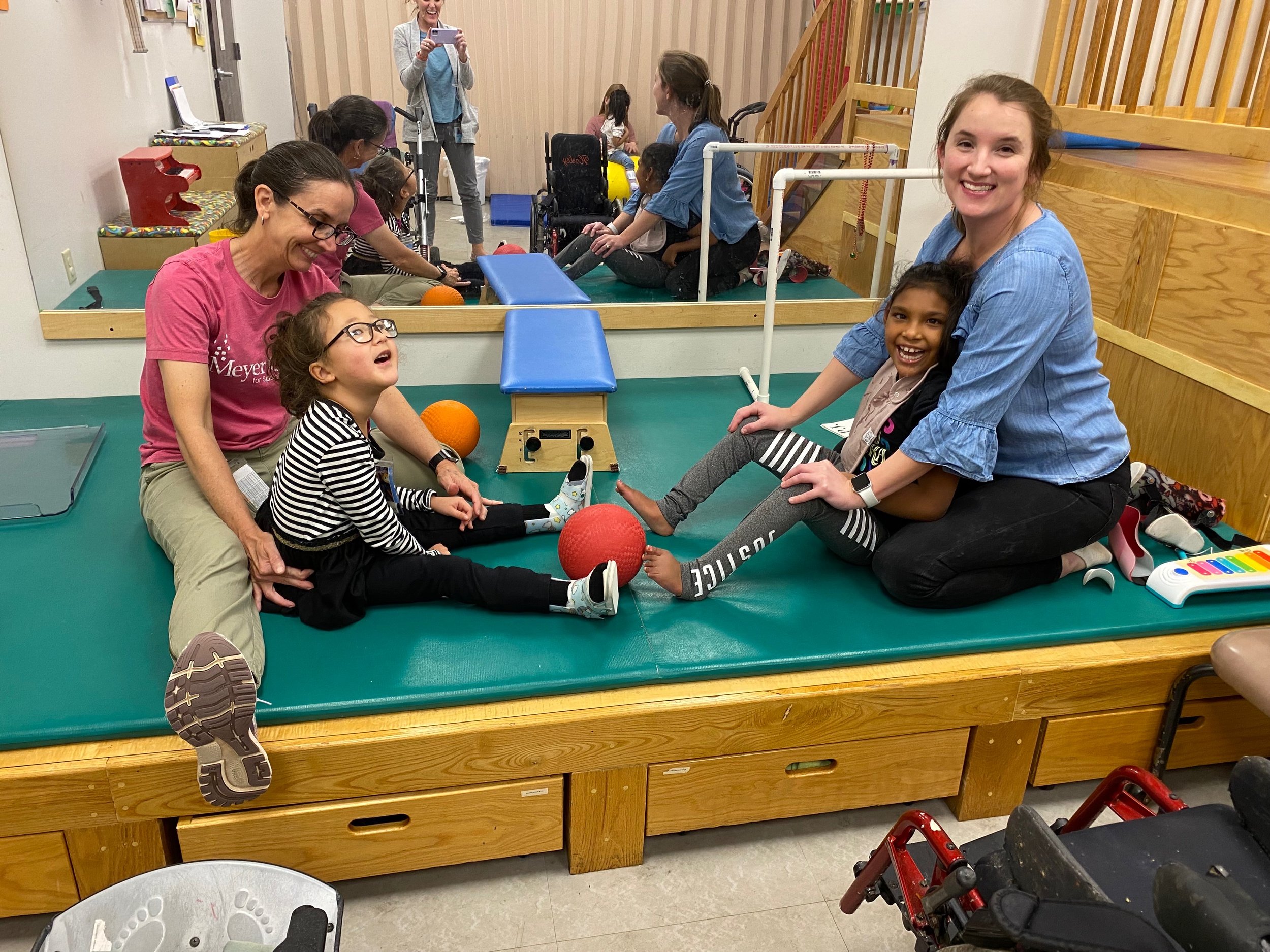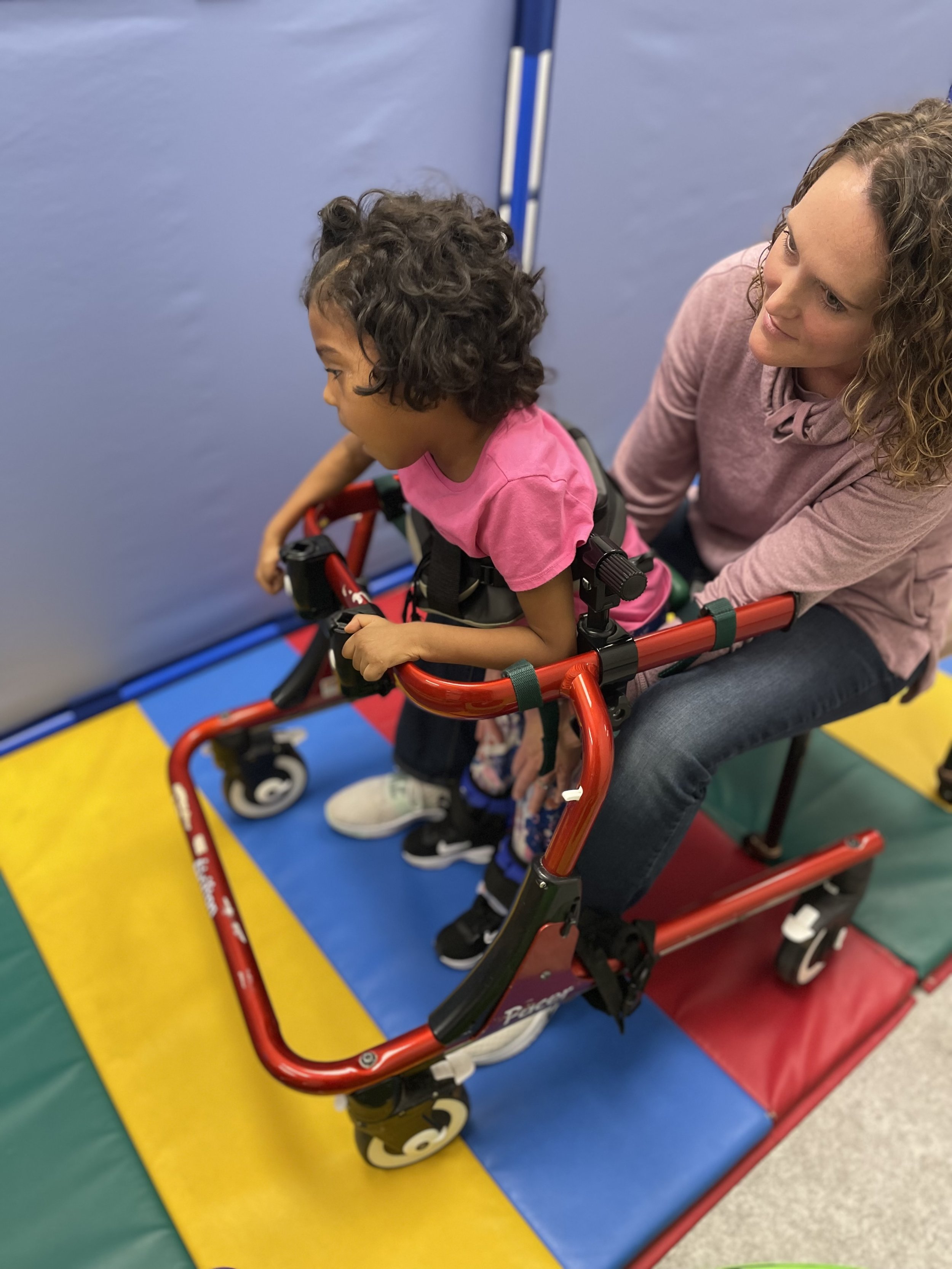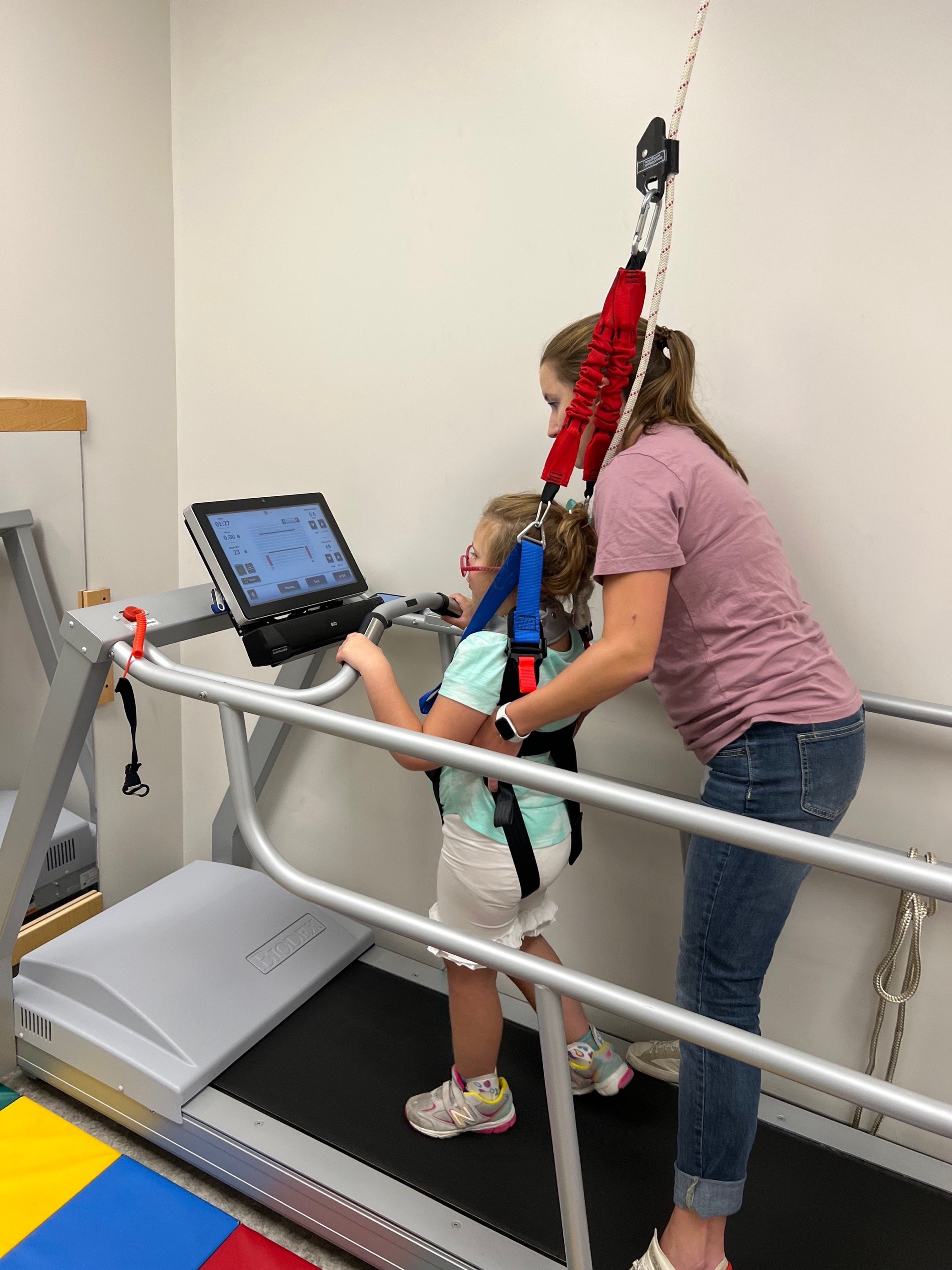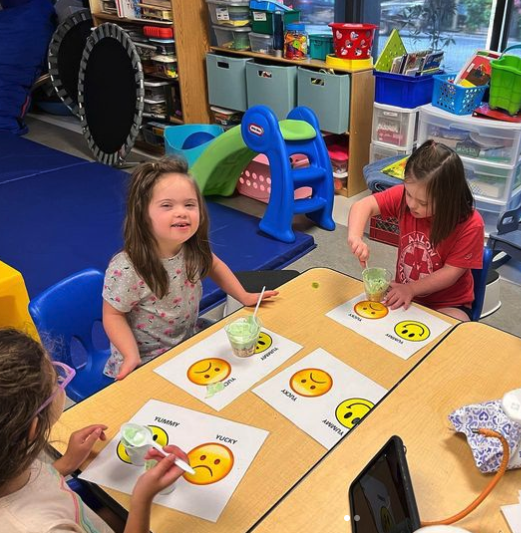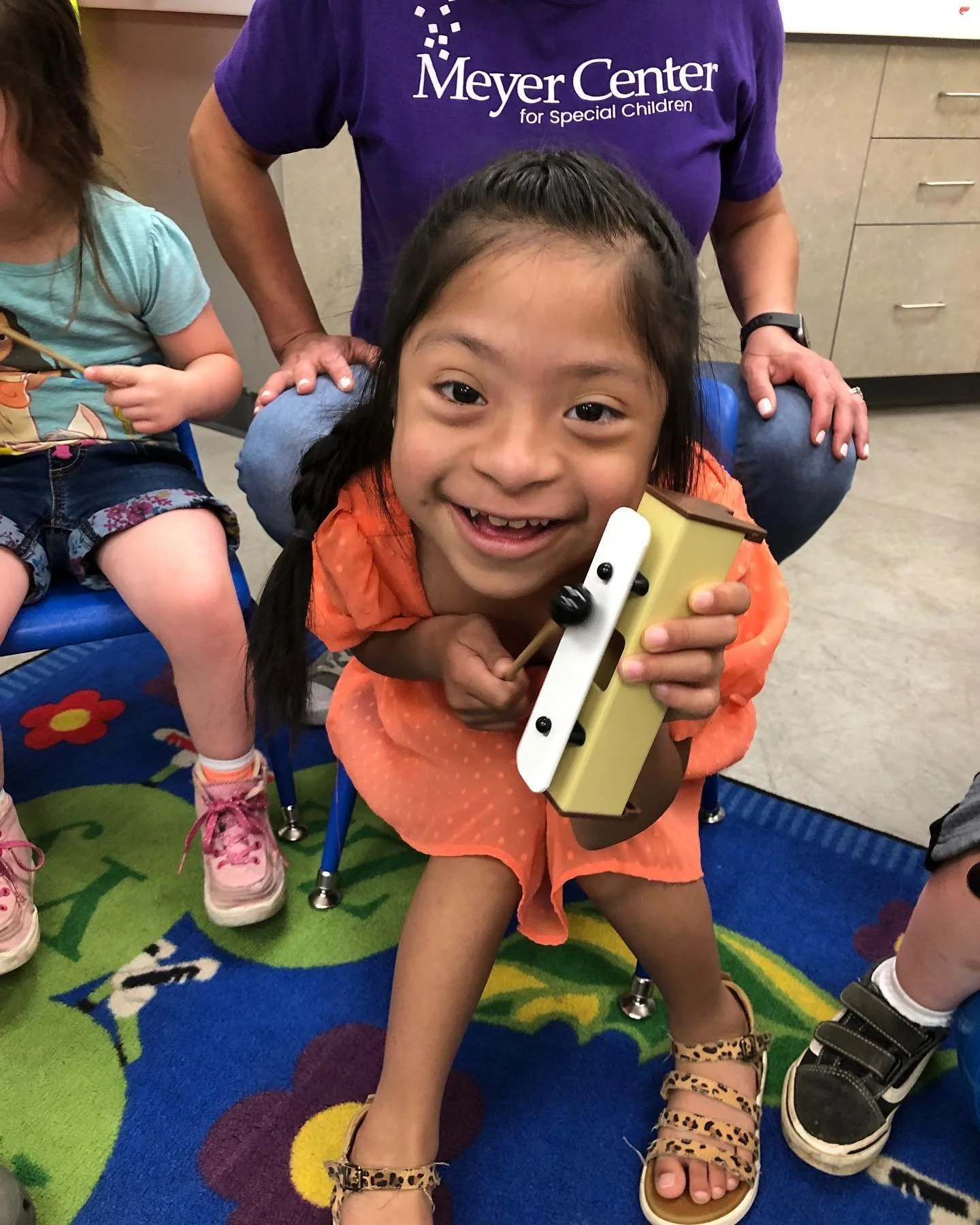Therapy
The “work” of a child is play
At the Meyer Center, we encourage children to grow and develop. Our therapy program is designed around a medical model. We focus on the child as a whole, concentrating on the skills that make them successful in life and not just in a school setting. To attend the Meyer Center, students must qualify for 2 of the therapies we offer, Occupational, Physical and Speech Therapy.
Occupational Therapy
Occupational therapy (OT) focuses on teaching skills and adapting tasks to allow for participation in activities throughout daily life in a meaningful way. In a child’s daily life, these activities include using sensory motor skills to explore the environment and play with toys and friends, using fine/visual motor skills to use tools such as holding a marker to make letters, and using self-care skills to get dressed, eat with utensils, and brush teeth. Occupational therapy helps children develop the sensory motor, emotional regulation, social relationship and self-advocacy skills needed to become healthy, functional adults.
The Meyer Center occupational therapist will complete a comprehensive evaluation of the child’s current skill level and determine opportunities for improvement in a child’s growth and development. The OT will assess underlying areas that may be impacting the child’s skill development and participation in daily activities (ex. Motor difficulties, sensory processing concerns, emotional regulation, cognitive abilities).
The Meyer Center occupational therapist will then use evidenced based strategies in a fun, motivating way to help the child develop the skills they need to use each day while simultaneously adapting activities and the environment to promote meaningful participation now. Meyer Center OTs work closely with the child’s team (parents, teachers, physical therapists and speech language pathologists) so that the child can generalize these skills and adaptations throughout their day.
Examples of medical diagnoses that occupational therapists treat
Developmental Delay
Cerebral Palsy and related neurological diagnoses
Genetic disorders such as Down Syndrome and Rett syndrome
Autism Spectrum Disorder
Sensory Processing Disorder
Attention deficit Disorder
Feeding aversion
Specialized Training and Certifications: All occupational therapists participate in continuing education and training in the following areas: Handwriting/Typing Without Tears, Strengths Based approach to Autism, Therapeutic Listening, Ball-a-Vis-X, Interactive Metronome, Sensory Based approaches to feeding, pediatric Neurodevelopmental Treatment, reflex integration, pediatric myofascial release, Kinesiotaping, CIMT (constraint induced movement therapy), and yoga for special needs. Our OTs also collaborate with the child’s physical therapist and parents to support adaptive equipment needs.
Speech Therapy
Speech therapy focuses on improving a child’s communication skills. We utilize a total communication approach, which supports the child’s use of multiple modalities, such as sign language, gestures, verbalization, low-tech and high-tech augmentative/alternative communication (AAC). After a child is enrolled, the Speech-Language Pathologist (SLP) will do an evaluation, set goals, and make recommendations for carryover activities the family can do in the home setting. A meeting is held with the parent and the child’s teacher and therapists to discuss the individualized education plan (IEP). The parent is encouraged to give input throughout the evaluation process.
Below are some of the medical diagnoses commonly associated with the speech-language delays/disorders that we treat:
Cerebral Palsy
Developmental Delay
Autism Spectrum Disorder
Dysphagia
Down Syndrome
Rett Syndrome
Spina Bifida
Chromosomal deletion/duplication syndromes
Our Speech-Language Pathologists provide assessment and intervention for communication disorders in the following areas:
Language pragmatics (social use of language), processing, attention
Articulation/Phonology
Fluency (Stuttering)
Oral motor/feeding/swallowing
Augmentative Alternative Communication (AAC)
“Sometimes real superheroes
live in the hearts of small children
fighting big battles.”
~Anonymous
Physical Therapy
Pediatric physical therapists help children improve their range of motion, strength, balance, flexibility, and movement patterns through play. They enhance gross motor skills including, but not limited to sitting, rolling, crawling, walking, running, and stair climbing. Here at the Meyer Center, our team is made up of four physical therapists and one physical therapist assistant with almost 60 years of combined experience. We work with children who have a variety of different diagnoses and gross motor abilities using numerous therapeutic techniques tailored to each child's specific needs. These include balance and coordination training, therapeutic exercises, kinesiotaping, myofascial release, sensory integration techniques, and gait training.
Physical Therapy and the Classroom
We take a collaborative approach to reach each child's specific goals and work closely with the classroom staff, especially during circle time or recess, to generalize their gross motor skills across different environments. We have physical therapy specific groups with a 1:1 student to therapist ratio, such as PE-readiness, music, and yoga, which incorporate both social interaction and gross motor skills. We work closely with local equipment vendors and orthotists who come regularly to the Meyer Center to meet each child’s equipment and orthotic needs.
Our goal is to help each child reach their maximal potential all while building a relationship with them and having fun!!
Feeding Therapy
The Meyer Center uses a multi-disciplinary approach to helping children develop the oral motor, swallowing and sensory motor skills needed for successful eating. When an issue with feeding or swallowing is suspected, the speech language pathologist and occupational therapist will evaluate the child’s feeding and swallowing skills.
At the Meyer Center, the speech language pathologist will assess a child’s oral motor and swallowing skills to include how a child is able to use the muscles of the mouth and tongue to bite, chew, and swallow food and liquid of various consistencies. The speech language pathologist may recommend the child receive a referral from the primary care physician for a swallow study to gain necessary information for this area. Meanwhile, the occupational therapist will evaluate a child’s sensory skills related to feeding. OT will assess the child’s sensory/emotional state around mealtimes as well as the child’s ability to accept foods with a variety of tastes, textures, and nutritional status. For example, does the child refuse or gag in response to new or different food items more than expected for his/her age. The OT will also evaluate a child’s ability to participate in the feeding process in an age-appropriate manner.
Based upon the results of the evaluations, the OT and SLP will work together to create a plan to address the child’s individual feeding needs. In many cases, the child will receive therapy from both disciplines to improve the underlying skills needed for successful eating, with speech therapy focusing on the oral motor/swallowing aspects and OT focusing on the sensory and mechanical processes of this skill.
Success in eating requires a team approach. The therapy team will work with the child’s caregivers including parents and classroom staff to incorporate treatment strategies and adaptations into all areas of a child’s life involving feeding.
“All kids need is a little help,
a little hope, and someone
who believes in them”
~ Magic Johnson
Music Therapy
Our music therapist uses evidence-based interventions in both classroom groups and co-treatment sessions with OT, PT and Speech therapists to help our students achieve their goals in the areas of cognition, socialization, fine/gross motor skills, sensory integration/regulation and communication.
Interactive Metronome
The Meyer Center is excited to offer Interactive Metronome (IM) as part of the therapy program.
“Interactive Metronome (IM) is an evidence-based assessment and training program. IM is proven to improve cognition, attention, focus memory, speech/language, executive functioning, comprehension as well as motor and sensory skills.” The Meyer Center currently has 5 occupational therapists trained in IM. When appropriate, the OT or OT assistant will incorporate this program into a child’s treatment plan to promote improvement in the areas listed above. Please click this link for more information about interactive metronome.
Specialized Therapies
Sensory - Our Sensory room has specialized equipment to help children who may not be able to interact with play activities in a traditional way. This is also a space that we use to help children learn important sensory regulation skills such as calming down when upset. Additionally, each OT treatment space has a variety of sensory motor equipment to support a child’s development of these skills (i.e., swings, climbing equipment, weighted vests).
Feeding
Music
Metronome
Treadmill - We also incorporate treadmill training into our sessions when appropriate. We are fortunate enough to have a pediatric treadmill and harness which can analyze gait while keeping the child safe and secure.




